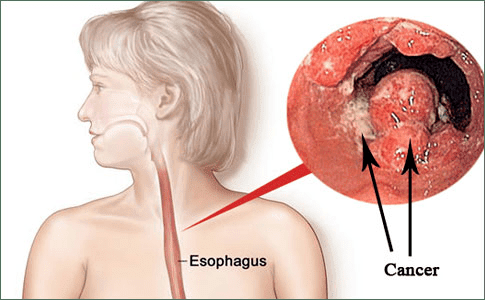Causes Of Esophageal Cancer (Cancer In Esophagus)
We speak of esophageal cancer if there is a malignant tumor somewhere in the esophagus. Esophageal cancer is a form of cancer that has become increasingly common in recent years. Esophageal cancer is more common in men than in women. Most people who get esophageal cancer are older than 50 years.
Types of esophageal cancer
There are different types of esophageal cancer. This is because a tumor can arise from different cells from the esophageal wall. The most common types are:
Barrett's esophagus
If acidic stomach contents regularly and long-term flows back into your esophagus, the esophagus can eventually be damaged. This is because the esophagus is not resistant to the aggressive hydrochloric acid contained in gastric juice. The stomach has a thick protective mucosal layer that protects the stomach wall against the acid. The esophagus does not have such a thick protective layer.
When stomach acid often flows upwards into your esophagus, esophageal inflammation can develop. As a result of the inflammation, a permanent change in the esophageal tissue can occur in the long term. This is also called Barrett's esophagus. Approximately 3-5% of people with Barrett's esophagus eventually develop an adenocarcinoma.
If heartburn is properly treated, esophageal damage can usually be prevented. There are various rules of life and dietary advice that can reduce the symptoms. More information about this can be found in the folder that you can download at the bottom of the page.
In addition, your doctor can prescribe medication that slows the production of stomach acid.
Cause of esophageal cancer
There is no exact cause for the development of esophageal cancer. Factors are known that increase the risk of developing esophageal cancer, namely:
Esophageal cancer usually causes no symptoms at first. Complaints often only arise when the tumor has expanded considerably. As a result, esophageal cancer is only discovered late in many patients. To discover esophageal cancer at an early stage, it is important that both patients and doctors recognize the signs and alarms properly. This is very important because the chance of recovery is greater if the tumor is detected at an early stage.
The following symptoms may indicate esophageal cancer:
Types of esophageal cancer
There are different types of esophageal cancer. This is because a tumor can arise from different cells from the esophageal wall. The most common types are:
- Adenocarcinoma
- Squamous cell carcinoma
Barrett's esophagus
If acidic stomach contents regularly and long-term flows back into your esophagus, the esophagus can eventually be damaged. This is because the esophagus is not resistant to the aggressive hydrochloric acid contained in gastric juice. The stomach has a thick protective mucosal layer that protects the stomach wall against the acid. The esophagus does not have such a thick protective layer.
When stomach acid often flows upwards into your esophagus, esophageal inflammation can develop. As a result of the inflammation, a permanent change in the esophageal tissue can occur in the long term. This is also called Barrett's esophagus. Approximately 3-5% of people with Barrett's esophagus eventually develop an adenocarcinoma.
If heartburn is properly treated, esophageal damage can usually be prevented. There are various rules of life and dietary advice that can reduce the symptoms. More information about this can be found in the folder that you can download at the bottom of the page.
In addition, your doctor can prescribe medication that slows the production of stomach acid.
Cause of esophageal cancer
There is no exact cause for the development of esophageal cancer. Factors are known that increase the risk of developing esophageal cancer, namely:
- smoking;
- excessive use of alcohol;
- unhealthy and unbalanced food;
- little fruit and vegetables;
- overweight;
- chronic heartburn / rising stomach acid (reflux).
Esophageal cancer usually causes no symptoms at first. Complaints often only arise when the tumor has expanded considerably. As a result, esophageal cancer is only discovered late in many patients. To discover esophageal cancer at an early stage, it is important that both patients and doctors recognize the signs and alarms properly. This is very important because the chance of recovery is greater if the tumor is detected at an early stage.
The following symptoms may indicate esophageal cancer:
- the feeling that food does not sink well in the esophagus; these complaints are called transit complaints;
- decreased appetite;
- inexplicable weight loss;
- a painful and/or full feeling in the vicinity of the sternum;
- dizziness and fatigue; these complaints can be caused by anemia. Anemia can be caused by long-term blood loss from the damaged esophagus.
- a tarry e, black stool by blood loss from a damaged esophagus;
- vomiting blood.
*Image source : Health.am

Post a Comment for "Causes Of Esophageal Cancer (Cancer In Esophagus)"